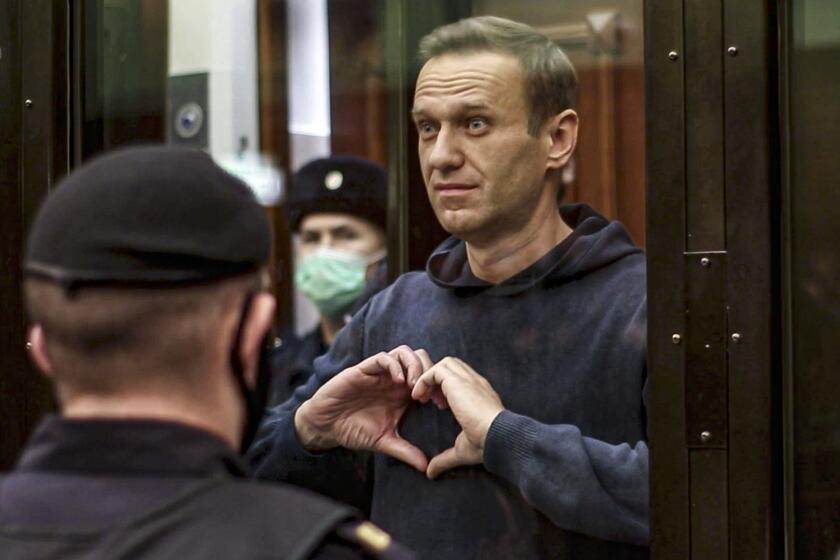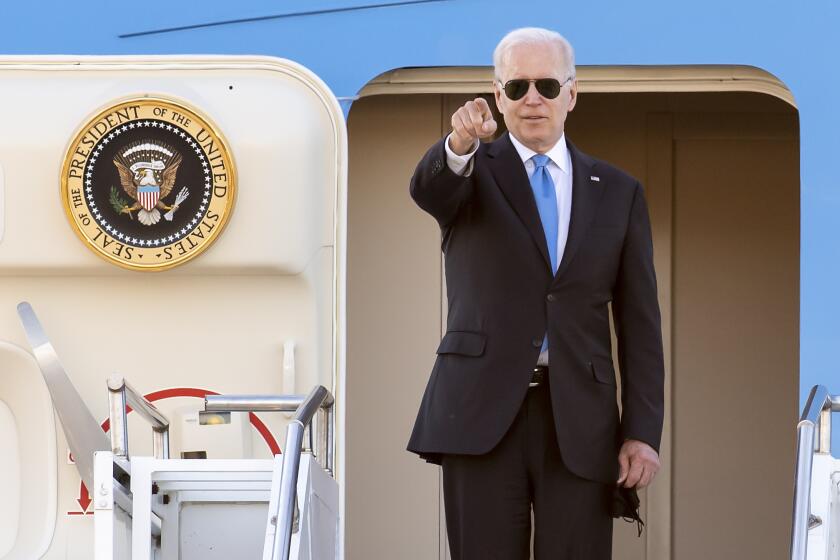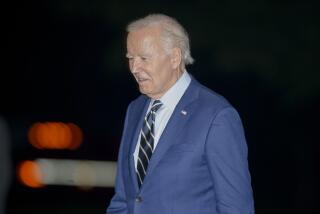Biden says Putin meeting was ‘frank,’ but Russian leader deflects criticism

President Biden says he emphasized human rights issues in his meeting with Russian President Vladimir Putin. That includes the cases of two Americans who Biden says are “wrongfully imprisoned” in Russia.
- Share via
GENEVA — President Biden and Russian President Vladimir Putin both emerged from more than three hours of direct talks declaring their first meeting a success, despite making little tangible progress toward immediately improving the strained relationship between Washington and Moscow.
Noting the “hype” around the summit, Biden said his aim was “straightforward” — to be frank with Putin about the Kremlin’s trampling of human rights, military adventurism in Ukraine and attacks on democracy, including interference in U.S. elections.
“I want President Putin to understand why I say what I say and why I do what I do and how I will respond to certain actions that harm American interests,” said Biden, who said the summit was about establishing “some rules of the road.”
If he drew any red lines with Putin, he was mostly vague in describing them during a 33-minute news conference with U.S. reporters following the talks.
Biden said that the prospect of an American military response to Russia’s actions was never broached. But he also suggested that America’s cyber capabilities exceeded Moscow’s, hinting that the U.S. could retaliate in kind to continued cyberattacks from within Russia.
And he said “the consequences ... would be devastating for Russia” if imprisoned Putin foe and opposition leader Alexei Navalny, who survived a poisoning with a Russian nerve agent last year, were to die in the state’s hands.
Biden acknowledged that Wednesday’s events did not constitute a “‘Kumbaya’ moment” but asserted that Putin, too, is interested in averting a new Cold War as he sees China on his borders, increasingly asserting economic and military power.
“I think there’s a real prospect to genuinely improve the relations” between Russia and the U.S. without giving up fundamental values, Biden said at his news conference, which started after the Russian leader spoke to reporters for about an hour.
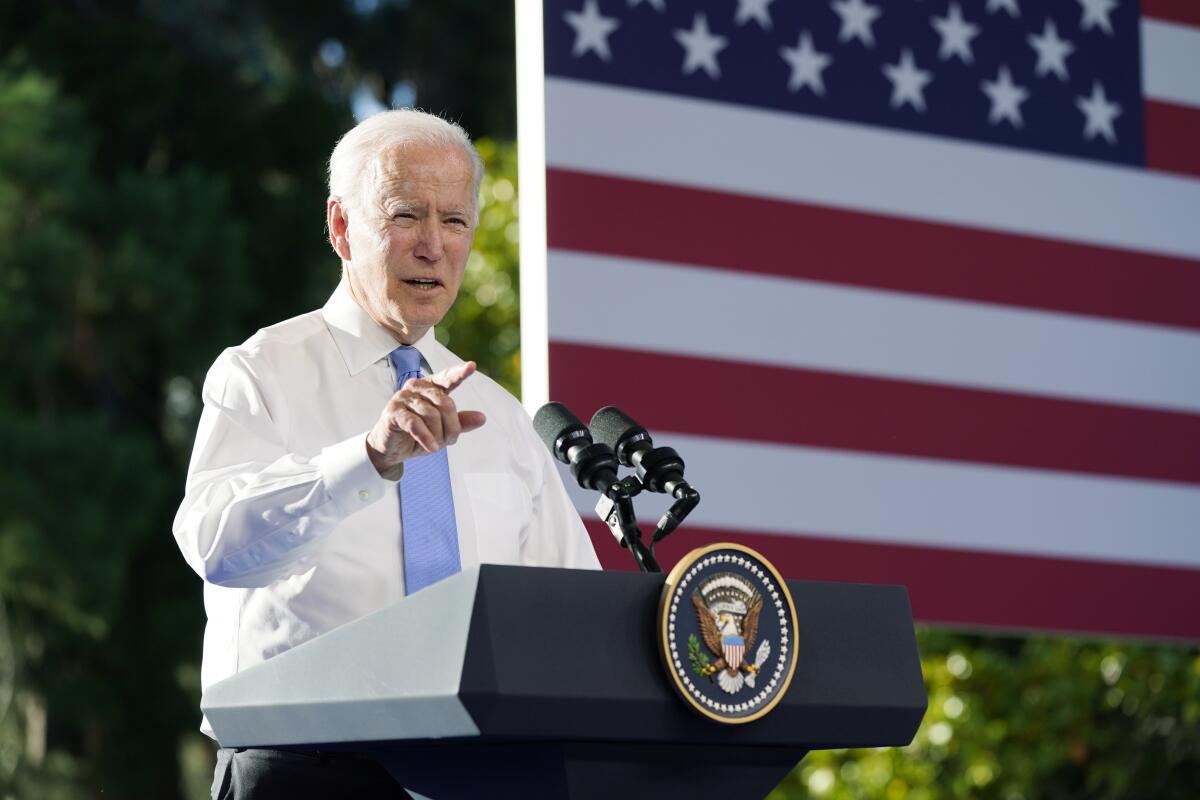
Biden repeatedly suggested that the potential success of this meeting on a picturesque hillside overlooking Lake Geneva wouldn’t be measurable for “six months,” snapping at a reporter who asked why he was confident Putin would change his behavior.
“I’m not confident I’m going to change his behavior,” Biden said, his voice rising. “What the hell?” (Biden apologized for being “a wise guy” to the reporter, CNN’s Kaitlan Collins, after motorcading to the airport for the trip home).
Both leaders noted the lack of outward enmity across the negotiating table. Biden, who said he watched most of Putin’s remarks, called the discussions “colloquial.” Putin said there was “no hostility; quite the contrary.”
“We don’t share the same positions in many areas, but I think both sides showed a willingness to understand one another and to find ways to bring our positions closer together,” Putin said.
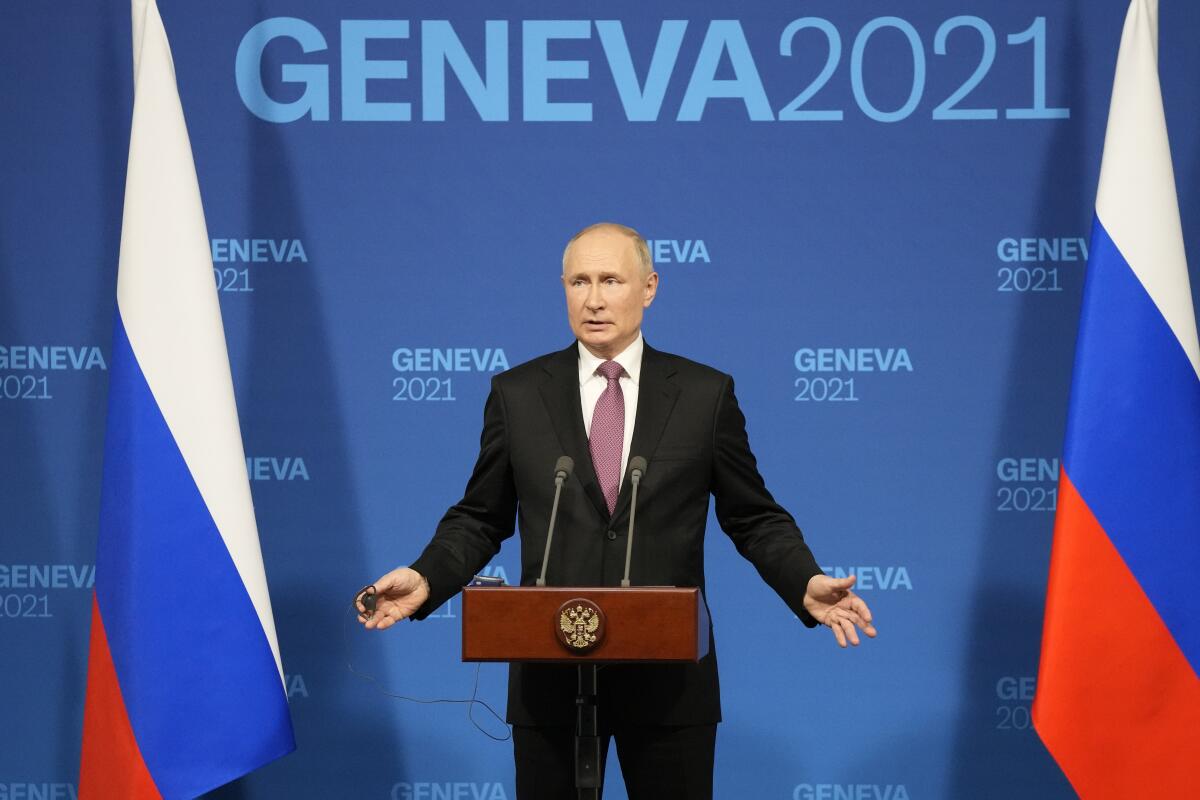
But Putin’s deflecting responses suggested that Biden’s diplomacy was unlikely to spur the autocrat, who has held power in Moscow for 22 years, to alter his behavior.
He rejected blame for the military buildup at the Ukrainian border and the jailing and deaths of opponents, and he brought up mass shootings in the United States and accused the U.S. of human rights violations.
Looking to absolve himself for jailing his top political rival, Putin compared Navalny’s protest movement seeking democratic reforms to the insurrectionists who sought to overturn the U.S. presidential election by storming the Capitol on Jan. 6.
Asked about that analogy, Biden called it “a ridiculous comparison.”
Putin also tried to explain away his crackdown on dissent — and responded testily to a question about his opponents’ deaths and imprisonment — with a reference to the largely peaceful Black Lives Matter protests.
“What we saw was disorder, disruption, violations of the law,” he said. “We feel sympathy for the United States of America, but we don’t want that to happen on our territory and we’ll do our utmost in order to not allow it to happen,” he said.
The sentencing of Putin critic Alexei Navalny doesn’t solve the Russian president’s problems.
To the cyberattack charges, Putin said of the U.S.: “All they do is make insinuations.” He said he thought the U.S. was not genuinely interested in getting to the bottom of these cases.
Biden said he told his Russian counterpart that critical infrastructure has to be off-limits to any attacks, cyber or otherwise, and he supplied him a list of 16 sites that Russia must never attack.
Biden said he also raised the issue of the repression in Moscow of several foreign news outlets.
Hanging over the summit were questions about at least two U.S. citizens imprisoned in Russia. Their families and other advocates had hoped Biden might be able to secure their release, possibly as a goodwill gesture from Putin.
When a reporter shouted a question asking why there was no apparent progress on the issue, Biden seemed to bristle and stopped in his tracks as he was leaving his post-summit news conference. “I will not walk away,” Biden said.
Putin earlier was also asked about U.S. and Russian prisoners in the two countries’ jails and whether there could be a release or swap. “We discussed it; we might be able to find some kind of compromise there,” Putin said.
But U.S. diplomats dismiss a prisoner swap because, they contend, jailed Russians in the U.S. have been convicted of serious crimes while the detained Americans are being held as potential political pawns.
Both are former U.S. Marines: Paul Whelan of Michigan and Trevor Reed of Texas. Reed was sentenced to nine years in prison in 2020 following what Russian officials described as a drunken encounter with police. Whelan, 51, has been jailed since 2018 on more serious charges of espionage and has repeatedly professed his innocence.
On a point of agreement, Biden said he and Putin concurred on efforts to prevent Iran from acquiring a nuclear weapon. The U.S. is engaged in negotiations in Vienna to return to the Iran nuclear accord, where Russia is one of six cosignatories. Additionally, the two sides agreed to start an interagency dialogue aimed at improving relations and to return their ambassadors to each other’s capitals soon.
Putin, in his news conference, praised Biden’s “moral values” as “attractive.”
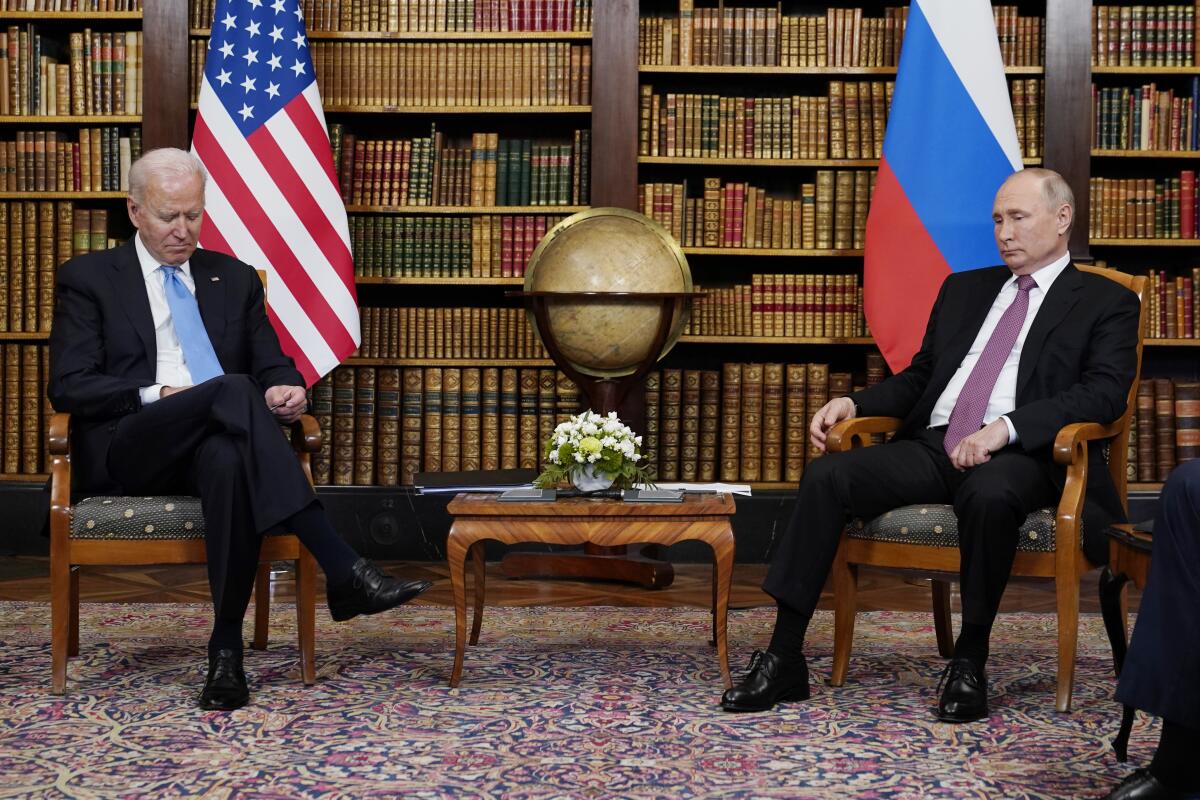
“It is clear to me that we did speak the same language. That certainly doesn’t mean we must look into each other’s eyes and find a soul,” he said, alluding to a 2011 meeting with Biden, then vice president. Biden had said he looked into Putin’s eyes and told him, “I don’t think you have a soul.”
Putin compared Biden with his predecessor, who frequently praised or deferred to the former KGB operative.
“President Biden is an experienced statesman,” Putin told reporters. “He is very different from President Trump.”
What to know about Biden’s first foreign trip as president, to the G-7, NATO summit, European Union and a meeting with Russian leader Vladimir Putin.
Biden and Putin had opened the Geneva meeting with gestures of respect. Putin, notorious for late arrivals intended to make his rivals wait, pulled into the driveway of the summit site first and ahead of schedule.
Biden, whose armored limousine pulled up 15 minutes later at the front door of the picturesque 18th century villa, stood with Putin as Swiss President Guy Parmelin welcomed them. Biden was the first to reach out to shake hands with Putin, later gesturing for the Russian leader to enter the villa ahead of him.
Inside, Biden thanked Putin ahead of the talks. “As I said outside, it’s always better to meet face to face.” And, in an aside that appeared to elevate Russia’s positioning on the world stage, Biden referred to the U.S. and Russia as “two great powers.”
When a U.S. reporter — just three made it into the room amid a physical scrum with Russian journalists outside — asked Biden if he trusted Putin, he appeared to nod. But White House communications director Kate Bedingfield tweeted quickly to clarify that the president “was very clearly not responding to any one question, but nodding in acknowledgment to the press generally.”
Interpreters sat just behind the two leaders. Russian Foreign Minister Sergei Lavrov sat to Putin’s left. Secretary of State Antony J. Blinken sat to Biden’s right.
The first session began at 1:45 p.m. and wrapped up an hour and a half later. More aides joined an expanded meeting later. The summit ended shortly after 5 p.m.
Biden had dismissed questions about whether he was meeting with Putin — whom he had called “a worthy adversary” — too soon in his presidency, noting that NATO allies who’d spoken to him about it uniformly expressed their support.
To a certain extent, Biden’s eagerness for the meeting reflected a desire to deal early on with issues related to Russia in a way that, if successful, would enable him to shift his foreign policy focus more toward the Indo-Pacific and efforts to counter China.
For Putin, the summit offered a major upside, as the possibility of improving relations with the U.S. could signal that democratic leaders are ready to move beyond tensions resulting from his incursions into Ukraine and meddling in U.S. elections.
Privately, however, U.S. officials had acknowledged they did not anticipate major breakthroughs.
Stokols reported from Geneva and Wilkinson from Washington.
More to Read
Get the L.A. Times Politics newsletter
Deeply reported insights into legislation, politics and policy from Sacramento, Washington and beyond. In your inbox three times per week.
You may occasionally receive promotional content from the Los Angeles Times.
